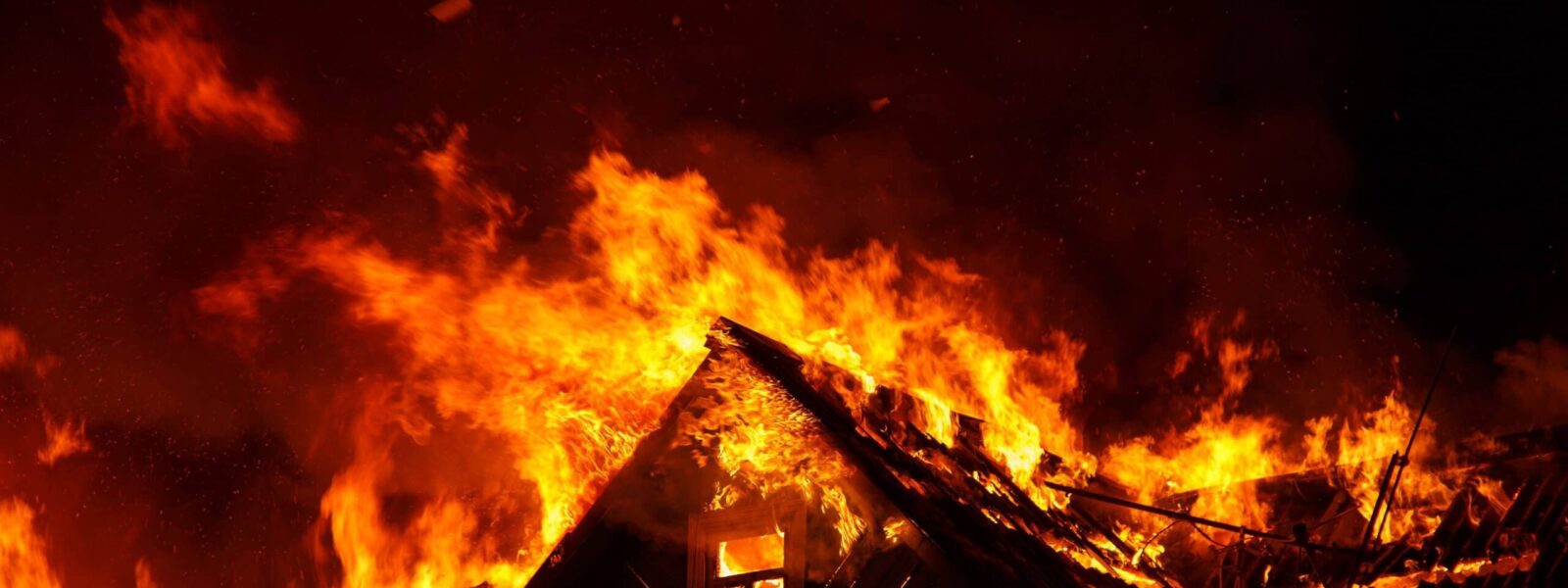A shocking statistic released in an arson study by the National Fire Chiefs Council outlined that of the 178,311 fires attended in 2017/18, people started 86,981 of these fires deliberately in England and Wales.
But, what is arson and what is the sentence someone will receive for committing arson? In this article, our solicitors explain what you need to know.
What is the meaning of arson?
Arson is also known as criminal damage by fire. Furthermore, the act of arson is a severe criminal offence where someone deliberately sets fire to a property. Property isn’t just limited to the burning of a building. It can also include the burning of land, boat, plane, among others.
There are multiple reasons why people commit arson, with some of the most common reasons being:
- Revenge
- Concealing another crime
- Murder
- Intimidation
- Collecting insurance money
This is not an exhaustive list, as people may commit arson for a wide array of reasons.
Examples of arson.
Example 1
Sarah’s boyfriend of 5 years has just let her know that he’s been cheating on her and now no longer wants to see her as he’s moving in with the other women. In the act of revenge, Sarah decided to go round to her ex-boyfriend’s house and put a cloth doused in petrol which she had lit with a match through the cat flap. As a result, the entire house went up in smoke.

Example 2
Mark decided to set some fireworks off in the street after having a few drinks at a party. Consequently, one of the fireworks shot sideways into the living room of a house and started a fire.

Sentencing guidelines for arson.
Most arson sentences fall somewhere between discharge to 8 years imprisonment. Although, the maximum sentence for arson is life imprisonment. The sentence for arson depends on two factors, which is culpability and harm, which are outlined below:
Culpability
Culpability is split into three separate categories.
Category A applies to high culpability. This category is where:
- A high degree of planning or premeditation took place.
Revenge attack. - Use of accelerant. An accelerant is any substance that can speed up the development of fire and help it escalate faster.
- Intention to cause either serious damage to property or serious harm to a person(s).
Category B applies to medium culpability. This category is where:
- There was some planning.
- Reckless behaviour caused serious damage to a property or a person(s).
Category C applies to lesser culpability. This category is where:
- The incident involved little to no planning.
- Reckless behaviour caused minor property damage.
- The offender suffers from a form of mental disorder or learning disability.
- Someone coerced the offender into committing the offence.
Harm
Harm is the other main factor that determines someone’s sentence. As with culpability, harm falls into three categories, which are:
Category 1 is the most serious of the three categories. This includes:
- Serious physical and/or psychological harm caused to the victim by the incident.
- An incident that causes a serious economic or social impact.
- An incident that causes a significant amount of damage to the property.
Category 2 is the category for medium-level offences. This includes any harm deemed too serious for category 3, but not serious enough to be considered category.
Category 3 is the least serious category. This offence covers instances where:
- There is no/ very minimal physical and/or psychological harm caused by the incident.
- The value of the damage is very low.
For more information on criminal offences and relevant charges, visit our criminal law page.
No arson case is the same. These guidelines give a general overview of how an arson sentence is given, not for a specific sense.
How can I limit the risk of arson?
In some cases, arson is impossible to prevent. However, suggested ways to reduce the risk of arson include:
- Installing double door locks.
- Fitting security alarms and security cameras.
- Installing smoke detectors.
- Purchasing fire extinguishers and fire-proof blankets.
Always ensure that your fire prevention systems are checked and working. Fires are devastating and it is best to always be prepared for a dire situation.
How can a criminal solicitor help?
If you’re facing an arson charge, you must contact a solicitor as soon as possible. And, due to life imprisonment being the maximum sentence for arson, not instructing a solicitor who has experience in criminal defence cases can result in avoidable yet costly mistakes.
In any criminal case, our solicitors can help you with the following:
- Representation during questioning
- Advice on taking plea deals
- Applications for bail
- Trial preparation
- Court representation
- Appeal applications, where necessary











Comments
house gon.... no wiffe.... no kildren..... nasty fire god.../..... pp burn.......
yes
Leave a comment Your email address will not be published.